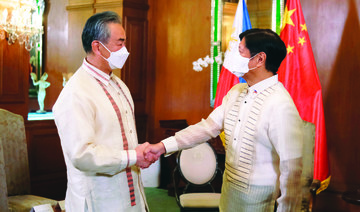MANILA: President Ferdinand Marcos Jr. on Monday vowed to safeguard Philippine territory against foreign powers while also promising that the country would continue to be a “friend to all,” in his first address to the nation as its new leader.
Marcos, who scored a landslide victory in May’s presidential election and was sworn in on June 30, had promised to open a new chapter in the country’s history and said that his administration would pursue an independent foreign policy.
In a comprehensive policy speech to Congress that was screened live on television, Marcos said he would create jobs and support growth by improving tourism, education, and modernizing agriculture, while also touching on plans for infrastructure developments, tax overhaul, and climate-change mitigation.
He pointed out that the Philippines’ foreign policy would remain independent, with its national interest serving as a “primordial guide.”
“The Philippines shall continue to be a friend to all, and an enemy to none,” he added.
“I will not preside over any process that will abandon even one square inch of territory of the Republic of the Philippines to any foreign power.”
The statement, likely alluding to the Philippines’ historic run-ins with Beijing in the South China Sea, drew a lengthy applause from Congress.
The South China Sea is a strategic and resource-rich waterway claimed by China almost in its entirety, but other countries, including the Philippines, Vietnam, Malaysia, and Brunei, also have overlapping claims.
Manila has filed hundreds of diplomatic protests against Chinese activity in the South China Sea in the past few years, after an international tribunal in The Hague dismissed Beijing’s sweeping claims to the region in 2016.
Under former President Rodrigo Duterte, the Philippines had embraced a Beijing-friendly direction while attempting to distance the Southeast Asian country from its colonial master the US.
With both major powers attempting to boost their influence in the region, their envoys have separately met with the new president in what appears to be a diplomatic push to deepen alliance.
In early June, US Deputy Secretary of State Wendy Sherman became the first top foreign official to meet Marcos prior to his inauguration. China’s Foreign Minister Wang Yi, on a working trip earlier this month, was the first top foreign official to visit Manila since the new Philippine leader took office.
“We will be a good neighbor, always looking for ways to collaborate with the end goal of mutually beneficial outcomes,” Marcos said.
“If we agree, we will cooperate and we will work together. And if we differ, let us talk some more until we develop a consensus,” he added. “After all, that is the Filipino way.”
In a speech that lasted one hour and 18 minutes, Marcos also said the government was in talks with Saudi Arabia to resume deployment of workers to the Kingdom, after it was suspended in November last year as Manila sought to settle the financial claims of thousands of Filipino workers.
“We can, and we will, negotiate to give our countrymen working there a decent wage, and to ensure that their rights and welfare are protected,” he added.
Saudi Arabia, where more than 1 million Filipinos work, was the most preferred destination of overseas Filipino workers in 2019, according to government data.
Philippines’ Migrant Workers Secretary Susan Ople will visit Saudi Arabia in the coming months to tackle the issue, Marcos said.
“We will renew the respect and friendship between our two nations, as exemplified by my late father and their king,” he added.






















